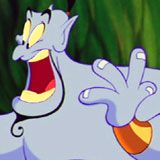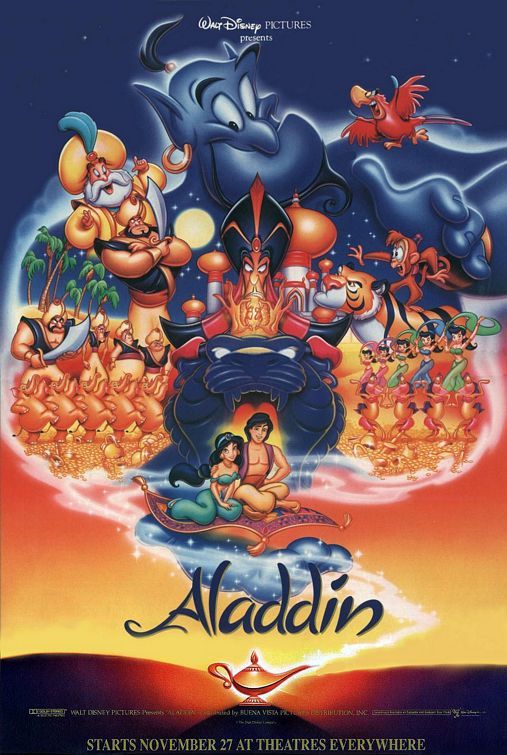MOVIE URBAN LEGEND: Robin Williams vowed never to work for Disney again because of a dispute about the size of the genie on the Aladdin movie poster.
Disney's 1992 film Aladdin was a massive blockbuster, and a good deal of the success was likely attributable to actor Robin Williams' inspired performance as the Genie. However, while the film itself was magical, Williams' experience with Walt Disney Pictures was much less so, to the point that he vowed not to work for the studio again because of what he claimed were violations of some interesting conditions he placed upon his involvement with the movie, including the size of his character on the posters. Read on to see what the deal was!
The story of Williams' problems with Disney contains a whole lot of "he said/they said," so it's difficult to break down the situation. First, what everyone can agree upon is that, at one point, Williams was very happy with Disney's movie business. It was while working for Disney's Touchstone Studios that the actor revived his then-faltering movie stardom in 1987 with Good Morning, Vietnam, which also netted Williams his first Oscar nomination for Best Actor. He followed that with another hit for Disney (also through Touchstone Studios) and another Oscar nomination for Best Actor for 1989's Dead Poets Society.
Between that good relationship and Williams’ desire to work on a project his three young children would enjoy, the actor agreed to voice the Genie in Disney's Aladdin.
Here's where one of the first instances of “depends on how you look at it" comes up. When Williams' side of the story is told, the fact that he voiced the Genie for essentially scale (rather than his normal high salary in the millions, he received just $70,000) is offered up as "he did the role for scale as a personal favor to Disney because of the success of his previous films for the studio." However, while it's true Williams accepted scale, that was fairly typical for the time whenever celebrities lent their voices to cartoon characters in Disney films. They usually worked for roughly scale (Tom Hanks and Tim Allen, for instance, both made scale for Toy Story three years later). I imagine that things are different now as, for instance, Hanks and Allen made a whole lot more for the Toy Story sequels.
However, there were certainly mitigating factors in the Williams situation: When he signed on to the film, he thought the role was relatively small. However, after Williams came in to lay down his lines, he ended up improvising so much extra material that the animators expanded the role of the Genie to make room for the jokes. So that brings us to the major issue for Williams. He asked (and Disney executives agreed) that his voice not be used to promote Aladdin and that his character not be used excessively in marketing. To wit, the request was "not more than 25% of the promotional poster for the picture." That was because Williams had a new feature being released about the same time from another studio, Toys, and he didn’t want to compete with his own work, especially as one film would be "his" while the other was a glorified cameo.
Disney attempted to comply with the poster requirement, simply by reducing the size of all the other characters so that the Genie was still the focus. As for the voice matter, well, Disney flat-out ignored that request (to stress, it was always a request and not a legal contract). They didn’t use Williams' name in commercials, so it wasn't "Aladdin starring Robin Williams!" but they definitely used his voice in the commercials (prominently so, from the dozen or so I've viewed from the time of the movie's release) and employed the character to sell toys and fast food tie-ins (also something Williams wanted to avoid) without the actor making any additional money (as Williams quipped at the time, "The only reason Mickey Mouse has three fingers is because he can't pick up a check." It did not help, I’m sure, that Toys was a flop while Aladdin was a blockbuster. Disney attempted to assuage Williams by sending him a Pablo Picasso painting worth more than $1 million at the time, but by this time, Williams was past the point of being soothed. He was finished with the Mouse, as it were. So when Aladdin 2 came out, Dan Castellaneta voiced the Genie.
Fox executive Joe Roth tried pitching Williams a project early in 1993 that was partially financed by Disney, but Williams turned it down because of the Disney connection. Ultimately, Roth and Williams did get together on a film, the blockbuster Mrs. Doubtfire. Soon afterward, Roth moved to Disney to replace the departing Jeffrey Katzenberg (who had recently left Disney to form DreamWorks with Steven Spielberg and David Geffen) and organized a public apology to Williams. So, even though Castellaneta had already finished recording his lines for the third Aladdin, Williams agreed to reprise his role and dubbed over Castellaneta's dialogue. And Williams returned to Disney to star in the 1996 live-action film Jack.
Amusingly enough, Williams later got into another argument with Disney over financing of a film, and as a result, he was not involved in doing the Genie's voice for other projects, such as the Kingdom Hearts video game. Although, once again, Williams appears to have kissed and made up with Disney, as he was named a "Disney Legend" in 2009. Time really does heal all wounds, eh?
The legend is ...
STATUS: True (although obviously there was more to it than just the size of the Genie on the poster)
Thanks to Jesse Kornbluth's excellent 1993 feature on Williams for New York Magazine for a lot of the information for this piece!
Feel free (heck, I implore you!) to write in with your suggestions for future installments! My e-mail address is bcronin@legendsrevealed.com.
Be sure to check out my Entertainment Urban Legends Revealed for more urban legends about the worlds of TV, Movies and Music!


